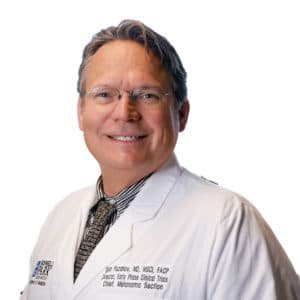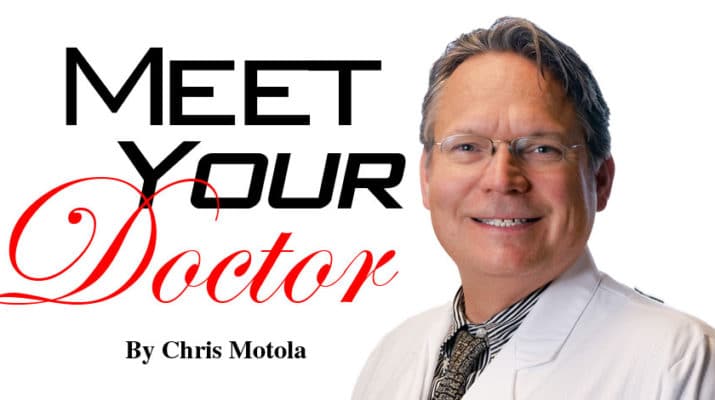Chief of melanoma at Roswell Park discusses clinical trial led by Roswell Park and UB to test effectiveness of anti-inflammatory drug for COVID-19
By Chris Motola

Q: You’ve been working on a study related to COVID-19. Can you tell us a bit about it?
A: The trial is for a treatment for patients who have really severe symptoms of COVID. They have this cytokine release storm, inflamed lungs and they may be intubated and on a ventilator. The drug we’re working with is called sarilumab. It’s normally used for patients with rheumatoid arthritis, but we also use it to suppress detrimental cytokine storms. But we have a lot more in the pipeline. We’re working on different approaches for both treatment and prevention. Prevention would be through things like a vaccine.
Q: It may surprise people to hear that Roswell Park, which specializes in cancer treatment, is working on the virus. What’s the overlap?
A: It’s not as surprising as you may think when you consider that a lot of cancer treatments are based on harnessing the power of the immune system. A lot of the processes the immune system uses to fight off the infection are also used to fight off cancer. For example, you activate your T-cells to kill viruses, and you activate your T-cells to attack tumors. So, there is an overlap between them.
Q: So, there’s cooperation going on between Roswell Park and the University at Buffalo on this?
A: I’ve been involved with Dr. Gene Morse [of the UB School of Pharmacy and Pharmaceutical Sciences]. He’s a world expert virologist with a focus on HIV. We cooperate, putting together everyone involved in drug development in Buffalo to work on this. So, when the virus showed up, we were kind of ready. He’s a virus guy and I am a drug developer for people with cancer. But the logistics and machinery of that is very similar to what you need to develop drugs for a virus. So that’s where we come in at Roswell even though we don’t have many patients who are infected with COVID. But we are in the region and we do have these tools and, the way I view it, it’s a war. Instead of sitting on those weapons and doing nothing, we’re going to deploy them in the fight. It looks like our infected numbers are going down judging by the briefings from the governor and county officials, but we want to be ready to deploy if there’s a second wave. The priorities may change if the cases go down and we reopen our oncology services in a safe manner. We always want to use our skills to help people as best as we can.
Q: What is a cytokine storm?
A: What happens is, when you get a virus, you are supposed to activate your defenses. Initially it’s a generalized immunity that is provoked. Like a general signal we inherited from our ancestors like, “this is a bacteria,” or “this is a virus.” So you create these non-specific barriers to get rid of the virus, as well as activating your specific immunities, your T-cells and B-cells, which are more like a bullet that specifically targets that virus. If you do it successfully, you survive the infection and hopefully become healthy again and immune, and hopefully immune into the future. But if there’s something wrong with your response — maybe you just can’t clear it fast enough — or you have too many particles to get rid of quickly, you kind of get stuck. Your immune system keeps revving up going to a higher degree, higher degree, higher degree. At some point your immune response may become harmful. It’s trying to kill the virus, but now it’s also damaging your good organs. So that’s what we mean by cytokine storm. The response is so severe it’s damaging your organs.
Q: And that’s been a big problem with COVID?
A: That’s right because basically when you get COVID virus, you just get it in the nose and it’s there. You may not even know you have it, never know you have an infection. You’re fine. In some people it goes into the lungs and starts revving up the immune system. Now you get a cytokine storm and inflamed lungs, you cannot breathe because it’s so inflamed. And now we know it’s not just inflammation, but these blood clots. So now you can’t exchange oxygen with your red cells because of these clots. So that’s why people sometimes collapse so quickly, because there is no blood flowing through the lungs. There’s no oxygen going to the brain. So that’s why people can look good, good, good and then suddenly they just die. It’s not everybody, though, so there must be some conditions that are connected to getting the really severe form of the disease. And we now know it could be diabetes, high-blood pressure. It could be genetics, it could be obesity. We know that obesity makes your body kind of inflamed. Fat is not an inert mass. Fat is an organ. It is working, and it’s working against your body. In this case, it seems to predispose people to bad outcomes. And, of course, it’s also associated with diabetes and high-blood pressure, so it’s a mix of things. We’re learning about the disease and how these things work together and make COVID worse for individuals.
Q: What about this disease makes it hard to treat? Or are coronaviruses in general just hard to treat?
A: Basically, we didn’t have a drug that showed good data that showed you could shorten the COVID symptoms. Now we have a drug that’s showing that can shorten symptoms by about one-third, maybe even better if you use it early like you would with Tamiflu. So we need it available, and we need it soon. And then hopefully even more effective agents and eventually a vaccine. Right now we don’t have a vaccine, but we have remdesivir for shortening time in hospitals. Even if it’s just shortening your stay from 15 days to 11, that allows you to see more patients and alleviates shortages of beds and ventilators.
Lifelines
Name: Igor Puzanov, M.D.
Position: Director of early phase clinical trials program at Roswell Park Comprehensive Cancer Center; chief of melanoma; professor of oncology at University of Buffalo
Hometown: Prague, Czech Republic
Education: Charles University (Prague); Vanderbilt University
Affiliations: Roswell Park Comprehensive Cancer Center
Organizations: American Society of Medical Oncology; Society of Immunotherapy in Cancer; American College of Physicians
Family: Wife; Children (Igor Jr., Barbara, Veronica)
Hobbies: Exercise; hiking, kayaking, rafting, skiing, camping

